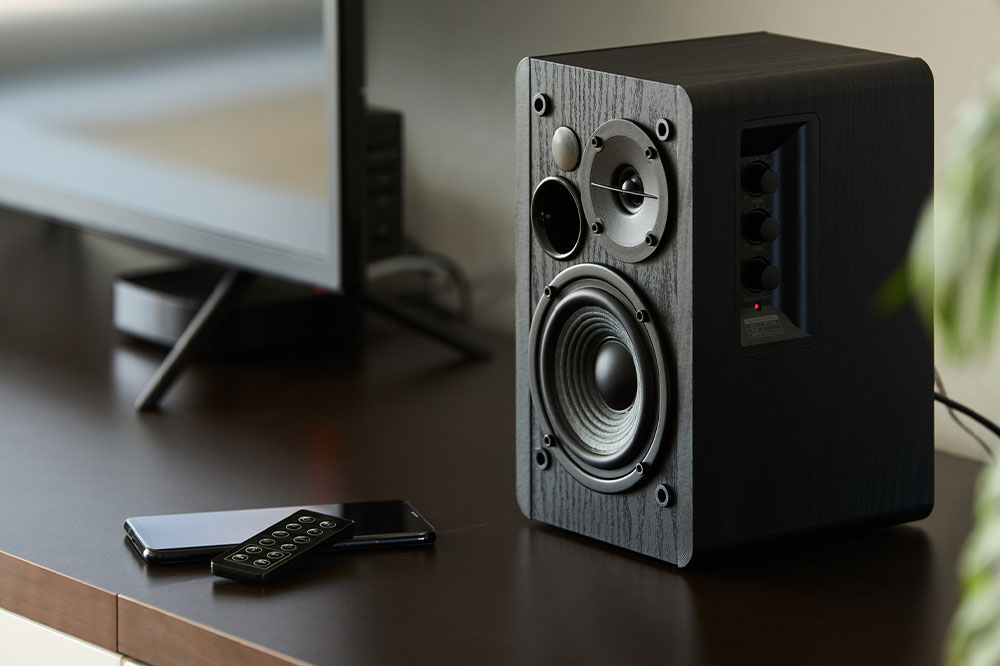8 Things to Consider While Buying Stereo Speakers

After a long day, all you probably want to do is kick back and relax, say, by watching television and listening to music. One of the ways you can elevate at-home entertainment is by installing stereo speakers that can enhance the audio quality. However, not all speakers might be the best fit for your home. So, to help you get started, here are a few things to consider before buying stereo speakers:
Budget
Stereo speakers come at varying price points. You could get one for as little as $70. However, the price can go up by thousands of dollars based on the brand, model, and popularity of the product. But buying the most expensive speaker does not necessarily mean that it will offer the best sound. Several factors go into determining the cost of a speaker, such as the brand, quality, size, and features. Further, you do not have to spend a lot of money on massive speakers for a small room. Similarly, a tiny, inexpensive speaker may not be the ideal choice for a large home. So it is important to set a budget considering your requirements before you make a purchase.
Sound quality
The quality of sound you need from stereo speakers should be a key factor in choosing the best option. So, before you pick a stereo setup for your home, head to a store and test the sound of multiple stereo speakers. You could ask the sales representative to give you a demo by playing an audio track or a movie. The key to selecting a good set of speakers is to look for ones with a balanced tone and those which are easy on the ears for longer periods. However, this is subjective as some prefer output that has higher trebles while others enjoy a setup with more bass. So, choose the one that gives you the kind of sound you want.
Type
While shopping for speakers, you will find a ton of options. Popular types include bookshelves and floor-standing stereo speakers. While these options usually have the best overall sound output, they may take up more floor space, which is something you should consider. On the other hand, you could opt for small satellite speakers and combine them with a subwoofer to create a high-performing, compact audio system. Additionally, a soundbar may work for those who want to enhance the audio experience at home without giving up too much space.
Room specifications
Apart from looking for the ideal set of speakers, you also need to think about the room and acoustics. The dimensions, materials, and contents of the room can determine the suitability of the speakers. Remember that sound can bounce off exposed walls, bare floors, and large furniture. On the other hand, the audio generated by speakers might be absorbed by rugs, carpets, and cushions. So, it is good to have a balance of both elements.
Amplifiers and receivers
While shortlisting the best speakers, you should also consider additional equipment. You may need an amplifier or receiver to deliver the right amount of power to the stereo speakers. A manufacturer will usually recommend a range of amplifier power necessary to power each unit. Some speakers may require 30 watts of output power to function well, while others might need 100 watts. Additionally, if you are going for a multi-channel or a surround-sound setup, it is better to stick to the same brand to ensure maximum performance from the speaker setup.
Protection
You would want your speakers to last a long time, especially if they cost a lot. One of the top areas of a speaker susceptible to physical damage is the tweeters. Some speakers come with tweeter grills, while others may not. So if you are going to pick up the latter, consider getting protectors for this component to shield it from accidents, especially if you have kids and pets around. At the same time, you could look for extended warranty options from manufacturers and retailers that could help you secure the cost of replacement or repairs for a few additional years.
Reviews
One of the most important things to consider before buying stereo speakers is the user reviews. You can find ratings and reviews on several retail websites. Customers usually share the pros and cons of speakers. Additionally, if a family, friend, or colleague has stereo speakers that you are considering, you can ask them about their experience. Certain channels on video streaming platforms review speakers to help users better understand the speaker’s functions. You could use this information to make a more informed decision.
Service centers
Buying a set of high-quality stereo speakers does not mean they will run without glitches forever. So, manufacturers or third-party retailers usually offer warranty coverage for a year or more and can either replace or address any defects. However, not all brands would have service centers to repair or replace the electronics in your region. So, before making a purchase, you should check if the manufacturer or the retailer offers after-sales services for speakers in your area. This could make it easier for you to get repair services quickly if the speaker stops working as it should.
A key tip to follow while buying stereo speakers is to avoid rushing the decision. If you are unsure of the type of sound system you require, consider shortlisting affordable speakers that you think will meet different needs. Compare prices, features, and warranty and then select the most suitable option. Alternatively, you can buy two affordable speakers if you cannot pick just one, and each set caters to different needs. Taking the time to explore your options can help you find the best set of speakers for your home.







